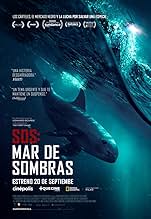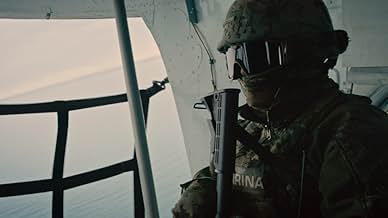Añade un argumento en tu idiomaThe vaquita, the world's smallest whale, is near extinction as its habitat is destroyed by Mexican cartels and Chinese mafia, who harvest the swim bladder of the totoaba fish, the "cocaine o... Leer todoThe vaquita, the world's smallest whale, is near extinction as its habitat is destroyed by Mexican cartels and Chinese mafia, who harvest the swim bladder of the totoaba fish, the "cocaine of the sea." Environmental activists, Mexican navy and undercover investigators are fightin... Leer todoThe vaquita, the world's smallest whale, is near extinction as its habitat is destroyed by Mexican cartels and Chinese mafia, who harvest the swim bladder of the totoaba fish, the "cocaine of the sea." Environmental activists, Mexican navy and undercover investigators are fighting back against this illegal multi-million-dollar business.
- Dirección
- Reparto principal
- Nominado para 1 premio Primetime Emmy
- 8 premios y 24 nominaciones en total
Reseñas destacadas
The documentary Sea of Shadows, directed by Richard Ladkani and produced by Nat Geo, delves into the fight to save the vaquita, the world's smallest and most critically endangered whale, caught in the crossfire of a global environmental crime network. Set in Mexico's Gulf of California, the film unfolds like an ecological crime thriller, combining investigation, action, and gripping tension.
The vaquita, whose population has dwindled to fewer than a dozen individuals, has become a tragic bystander in the illegal totoaba fish trade. The totoaba's swim bladder is a coveted delicacy in traditional Chinese medicine, fueling a lucrative black market that links local poachers, Mexican cartels, and Chinese traffickers. This illegal activity not only threatens marine wildlife but also destroys the fragile ecosystem of the Sea of Cortez.
The documentary closely follows scientists, conservationists, investigative journalists, and military operatives as they work tirelessly to save the species on the brink of extinction. From undercover operations to maritime patrols, the team faces an uphill battle against poachers and powerful criminal networks. Often, Mexican authorities appear either unwilling or unable to act, leaving activists with the dangerous task of confronting violence and organized crime on their own.
With stunning visuals and a sharp narrative focus, Ladkani captures the severity of the crisis, exploring how greed and governmental neglect have pushed an iconic species to the edge. The film not only exposes the environmental devastation but also highlights the courage of those risking their lives to protect biodiversity.
Sea of Shadows is a powerful and urgent wake-up call that reveals the dark connections between environmental destruction and global crime networks. It underscores that the fight to save the vaquita is ultimately a fight for the planet's future.
The documentary is about the extinction of one special dolphin-like whale species, the vaquita, which is the species that will become extinct because of overfishing for another, highly valuable species of fish. (We never hear much about the other MORE valuable species, although one can assume that there might not be a finite number of those particular fish.)
So one species is now threatened for complete extinction and it happens to be a very attractive looking dolphin-like creature, which naturally inspires audience sympathy. Of course, we all want to save a doomed species; that goes without any argument. But the storyline of this documentary is a combination of showmanship and diversion: the actual 'Elephant in the room' is hardly never discussed in detail--that Elephant is the Chinese elite.
The filmmakers pride themselves on following the perpetrators who are the lowly fishermen, desperately doing whatever they can to survive (and one almost expects another documentary will be made next year, taking the point of view that this documentary is taking away the fishermen's livelihood). Up to this point, the fishermen have a livelihood based on these expensive fish bladders, and so we can understand why they don't want the filmmakers to take that lifeline away. And we hear that the local police force and even the military are in on the take, accepting bribes to allow the renegade fishermen to roam free in the waters, capturing and killing whatever species that gets in their way of making a big payoff. This is human nature, yet another documentary.
But what is missing here is the explanation of why this is happening in the first place: it is mentioned in passing in the doc that there is a certain belief among the Chinese oligarchy that the bladders of these fish are worth millions. Why is this so? We really never know. And the filmmakers never bother to explore this peculiar point that is central to the story. They also don't bother to follow up on a tip that brings them face to face with some of the Chinese oligarchs. Why? We don't know.
Now, one can only surmise from all this that the filmmakers, NatGeo, and Leonardo diCaprio have decided that it would not be in their financial interest in discussing the particular reason for the Chinese obsession with fish bladders. Maybe it's because Leo's films would be banned in China and therefore Leo loses a couple of million dollars? Maybe because they couldn't make a deal at Cannes unless they removed that information so the distribution deal would be a few hundred thousand less? This leads to one imagining a scene of the filmmakers sharing caviar and champagne on a yacht off the Croisette with the same exact Chinese billionaires who paid hundreds of thousands of dollars to obtain the fish bladders.
There is nothing inherently wrong with the film, which is filled with sympathetic characters: the handsome young Greenpeace Volunteer, who is a verified chick magnet (played by Zac Efron in the Disney adaption); the Jane Goodall-type earnest woman scientist with a heart of gold (Susan Sarandon); the good-looking daddy figure who leads the chase of the uncaring fishermen, (who would be played by none other than Harrison Ford), and the tough-talking, non-nonsense Journalist (Antonio Banderas) who goes on an investigative binge, only to fall down the rabbit hole when all the police and military he interviews are a part of the giant conspiracy. There is one point where the Journalist is earnestly grilling the heads of state and a senior military gent, which comes off as naive as we in the viewing seats realize that the very same officials who are supposed to be guarding against this crime are themselves on the take.
But the reason why the documentary does not hold any water (pun intended) is because the filmmakers continually go back to the low-lying fruit of the fishermen, as if they were the only ones who caused the devastation. In any honest analysis, the fishermen are only small pawns in a much bigger game, (as are the police and the military) and are being played by huge multi-billionaires, who are the ones pulling the strings and manipulating everyone like the Puppet Masters they are. Even the great Leo diCap himself is probably a puppet who was allowed out of the cage to promote this doc so that we can keep on scrambling after 'Shadows', and therefore, the real perpetrators who are in control are never to be seen or ever revealed.
Selecciones populares
- How long is Sea of Shadows?Con tecnología de Alexa
Detalles
Taquilla
- Recaudación en todo el mundo
- 1996 US$
- Duración1 hora 44 minutos
- Color
- Mezcla de sonido
- Relación de aspecto
- 2.35 : 1
Contribuir a esta página

























